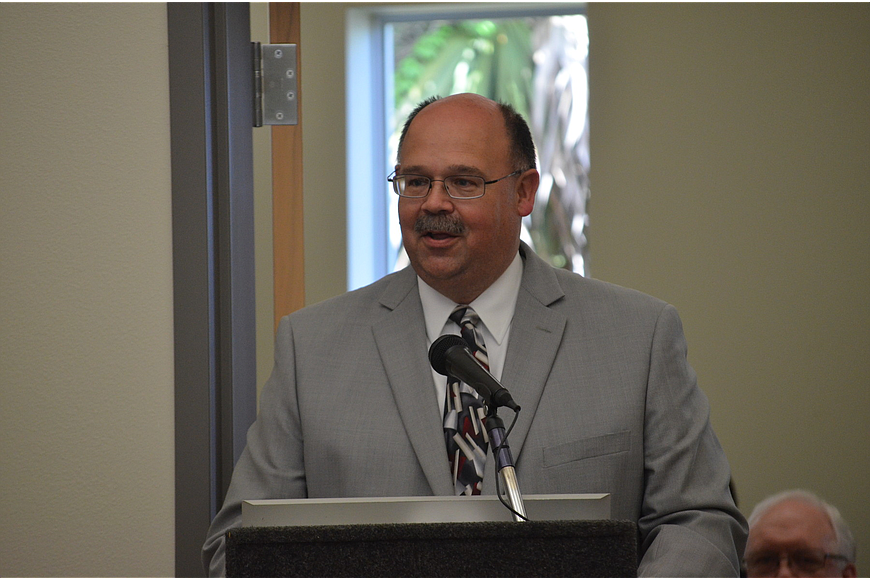- November 26, 2024
-
-
Loading

Loading

The County Commission last week approved the creation of a Behavioral Health Advisory Council and the use of $2.5 million in American Rescue Plan funds to improve mental health services, in the same week Sarasota Memorial Hospital began construction on a new mental health facility.
The motions followed the commissioners’ acceptance of the Mental Health Task Force report in January. Commissioners questioned the governance and funding for the services recommended in the report, which Health and Human Services Director Chuck Henry addressed last Tuesday.
“A Behavioral Health Advisory Council would act as a conduit for public information and input to be given back to the board,” Henry said. “It would also provide advice and funding recommendations to the board.”
Before last Tuesday, there were nine categories of focus for the Health and Human Services Council. A subcategory contains “core human services” included funding and resources for mental health, homelessness, child welfare and early learning, according to Henry’s presentation to the commission.
With the creation of the Behavioral Health Advisory Council, mental health services will have funding and resources specifically dedicated to it. This was made possible by the commission’s previous approval to create the Sarasota Behavioral Health Special District.
“The Behavioral Health Advisory Council would review the mental health needs of residents,” Henry said. “They would evaluate the status and sufficiency of the services provided by the county, identify emerging needs and changes, develop strategic initiatives and look for opportunities for braided funding.”
The council will consist of nine people. An insurance administrator and representatives of Central Florida Behavioral Health, Sarasota County School District and a local foundation will help make up the council.
January’s Mental Health Task Force Report recommended 44 projects regarding mental health needs and 17 projects that could be implemented with $6.5 million. For the time being, the top 13 priorities from the report will be worked towards through a $2.5 million allotment from American Rescue Plan federal funds.
“The $2.5 million in ARPA funds will cover 13 initiatives from 2023 through 2025,” Henry said. “In 2026, we would have to rely on general funds or other available funds over time. It's fiscal year 2026 where we’d have a concern on how to continue this going on.”
County Commissioner Christian Ziegler was concerned what would happen if citizens became reliant on programs after ARPA funds are no longer available in 2026. Henry suggested another evaluation of the programs in late 2025, to manage that concern on a per-program basis.
While she voiced the importance of keeping track of funds, Commissioner Nancy Detert said she was confident a long-term funding solution will be found.
“We are dealing with money from the federal government of the likes we’ve never seen because of COVID,” Detert said. “Considering the board will change, the world will change, all we can do is deal with the reality of today. … Mental health and substance abuse have been ongoing problems.”
“Who knows how many kids we’re going to have that will have issues from being locked up and having their lives so changed,” Detert said. “With that said, I’m grateful for the funds we’ve received, and I’m happy spending it on mental health.”
Commissioner Mike Moran brought up the concern of duplicate services, as Sarasota Memorial Hospital began construction on the new Cornell Family Behavioral Health Pavillion, which will replace the current Bayside Center for Behavioral Health.
The Cornell Family Behavioral Health Pavillion will be a three-story facility that will provide services for many demographics for a variety of behavioral health issues. It was partially funded through a $10 million donation from Target CEO Brian Cornell.
“My question was, ‘Is Sarasota Hospital putting millions of dollars in a mental health facility an opportunity or a threat?’” Moran said. “I’m not saying that isn’t fabulous. I’m just saying we need an advisory board to give us guidance on this. I’ll happily move this (creating an advisory council) forward.”
Henry said that the Mental Health Task Force did not correlate a person’s address to the facilities and programs that they have previously used. But the task force has evaluated what services are offered in each part of the county, which will be taken into account as the process moves forward.
The Behavioral Health Advisory Council and the funds gathered through ARPA will be used toward projects from the Mental Health Task Force Report. Among the highest priorities in the report were additional crisis response and mobile crisis response units, which could provide services on an immediate, 24-hour basis.
The report also showed an increased need in treatment and counseling. The priorities within that category included expanding trauma treatment, increasing psychiatric outpatient capacity, therapeutic group homes for older youth and a specialty care services for high-risk youth.